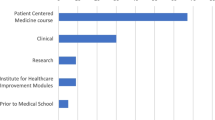Abstract
Quality improvement and patient safety education is an Accreditation Council for Graduate Medical Education (ACGME) common program requirement for hematology/oncology fellowships. Interprofessional clinical patient safety activities, such as root cause analyses (RCA), can be challenging to incorporate into busy schedules. We report on a multicentered experience utilizing a simulated RCA educational module in an attempt to provide fellows with the tools needed to participate in a live RCA and to increase awareness of the need to analyze patient safety events. The 2-h module included a didactic session explaining the basics of an RCA including common terminology, effective chart review, and personal interviews. The fellows assessed a patient safety event of a missed coagulopathy and created an event flow map and fishbone analysis. They then formed root cause/contributing factor statements and proposed a solution. Twenty-three fellows from two institutions completed the experience. There was a significant difference in fellow reported comfort with participating in a live RCA (p = 0.03), and in utilizing the tools of an RCA following the mock RCA experience (p = 0.005). About 70% of respondents felt that as a result of the mock RCA, they were more likely to report a near miss or adverse event and were more likely to be thorough in their documentation. Mock RCAs are a feasible method of incorporating ACGME-required patient safety activities into hematology/oncology fellow education and are effective in increasing their comfort and understanding of important quality improvement skills.
Similar content being viewed by others
References
“ACGME Common Program Requirements (Fellowship) https://www.acgme.org/Portals/0/PFAssets/ProgramRequirements/CPRFellowship2019.pdf (Accessed 4/12/20)
Bar-On M, Berkeley RP (2016) Early engagement of residents into the root cause analysis process. J Grad Med Educ 8(3):459–460. https://doi.org/10.4300/JGME-D-15-00669.1
Quraishi SA, Kimatian SJ, Murray WB, Sinz EH (2011) High-fidelity simulation as an experiential model for teaching root cause analysis. J Grad Med Educ 3(4):529–534. https://doi.org/10.4300/JGME-D-11-00229.1
Swamy L, Worsham C, Bialas MJ et al (2018) The 60-minute root cause analysis: a workshop to engage interdisciplinary clinicians in quality improvement. MedEdPORTAL 14:10685. https://doi.org/10.15766/mep_2374-8265.10685
Murphy M, Duff J, Whitney J, Canales B, Markham MJ, Close J (2017) Implementation of a mock root cause analysis to provide simulated patient safety training. BMJ Open Qual 6:e000096. https://doi.org/10.1136/bmjoq-2017-000096
Author information
Authors and Affiliations
Corresponding author
Additional information
Publisher’s Note
Springer Nature remains neutral with regard to jurisdictional claims in published maps and institutional affiliations.
Rights and permissions
About this article
Cite this article
Wallace, D., Cochran, D., Duff, J. et al. A Multicentered Academic Medical Center Experience of a Simulated Root Cause Analysis (RCA) for Hematology/Oncology Fellows. J Canc Educ 37, 911–914 (2022). https://doi.org/10.1007/s13187-020-01899-8
Accepted:
Published:
Issue Date:
DOI: https://doi.org/10.1007/s13187-020-01899-8




